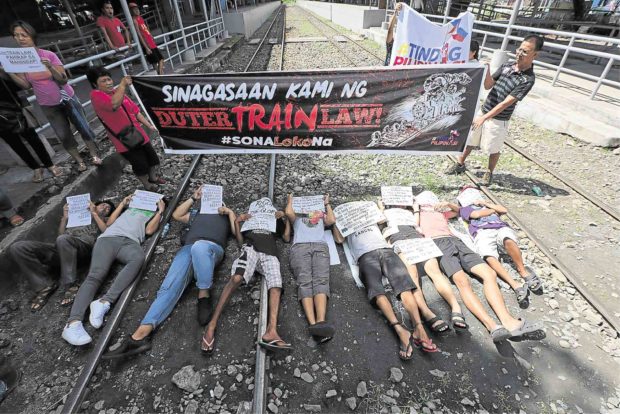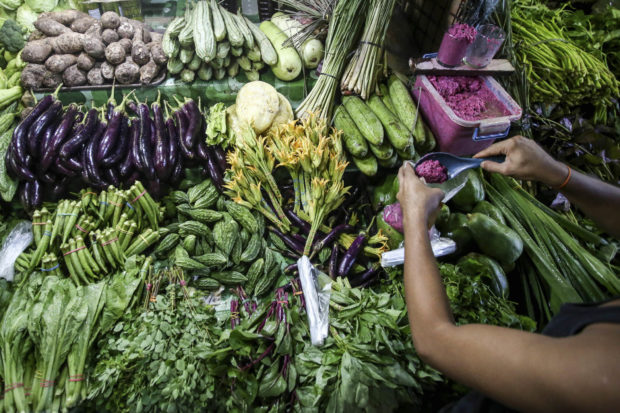Inflation hits 5.2%, exceeds gov’t target

STOP THE TRAIN Members of urban poor groups stage a die-in protest on the Philippine National Railways tracks crossing España Boulevard in Manila on Thursday to dramatize the hardships brought about by the Tax Reform for Acceleration and Inclusion (TRAIN) Act. —GRIG C. MONTEGRANDE
Inflation picked up faster than expected to 5.2 percent year-on-year in June, the highest in more than five years, due to costlier food and “sin” products, the government reported on Thursday.
The Bangko Sentral ng Pilipinas (BSP) vowed to get the inflation rate back to its 2-4 percent target range amid increasing pressure for more interest rate hikes than the two made this year.
The Philippine Statistics Authority (PSA) reported that June’s faster inflation was “primarily brought about by higher annual rate posted in the heavily weighted food and nonalcoholic beverages index at 6.1 percent.”
June’s consumer price index was above the 4.8 percent forecast in a Reuters poll of economists, bringing the average inflation rate to 4.3 percent in the first half of the year.
Article continues after this advertisement
‘Manageable’
Article continues after this advertisementSocioeconomic Planning Secretary Ernesto Pernia told a news conference that the June inflation rate was “rather unexpected.”
“Most observers and analysts did not expect inflation to spike in this manner,” said Pernia, who is also head of the state planning agency National Economic and Development Authority (Neda).
He said, however, that he believed the six-month average inflation rate of 4.3 percent remained “manageable.”
Malacañang said the faster inflation rate was “not something to worry about.”
Presidential spokesperson Harry Roque said the rise in inflation was due to “money going around,” such as the spending on the administration’s infrastructure program.
He also cited the greater spending power of the people as a result of tax reforms, and free tuition in state colleges and universities.
PSA data showed that prices of alcoholic beverages and tobacco climbed 20.8 percent in June; housing, water, electricity, gas and other fuels, 4.6 percent; furnishing, household equipment and routine maintenance of the house, up 3 percent; transport, up 7.1 percent; communication, up 0.4 percent; and education, up 4 percent.
Third rate hike
Last month’s inflation print marked the fourth month that the pace of price increase was faster than the BSP’s 2-4 percent comfort range for this year and next, leaving the door open for a third interest rate hike this year.
Rising inflation, blamed on the enforcement of the Tax Reform for Acceleration and Inclusion (TRAIN) Act starting January, a weak peso and firmer global oil prices, has prompted the central bank to raise interest rates in May and June.
The TRAIN law raised the ceiling on tax-exempt income, but imposed excise on oil products despite the value-added tax on fuel and slapped higher taxes on tobacco, alcohol and other so-called sin products.
Under the TRAIN law, the excise on cigarettes rose to P32.50 per pack effective Jan. 1 from P30 a pack last year.
Also, excise slapped on alcoholic drinks go up every year under the Sin Tax Reform Law of 2012.

HIGHER PRICES The government’s latest bulletin announcing a 5.2-percent inflation rate in June will likely trigger a fresh round of increases in vegetable prices at QMart in Quezon City.—JAM STA. ROSA
Food prices
Starting July, the excise on cigarettes will further rise to P35 per pack, as required by the TRAIN law.
Improved tax compliance by Mighty products, now owned by Japan Tobacco International, had also been blamed by the Department of Finance (DOF) for pushing cigarette prices higher, as correct tax payments elevated the brand’s retail prices.
The food-alone index rose 5.8 percent in June, due to price increases in rice (up 4.7 percent); corn (up 14.1 percent); other cereals, flour, cereal preparation, bread, pasta and other bakery products (up 2.4 percent); meat (up 5 percent); vegetables (up 8.6 percent); sugar, jam, honey, chocolate and confectionery (up 3.9 percent); and other food products (up 3.1 percent).
At the end of the first half of the year, headline inflation averaged 4.3 percent, beyond the government’s 2-4 percent target range.
Headline inflation in the National Capital Region picked up faster by 5.8 percent in June from 4.9 percent in May, while the rate outside Metro Manila climbed to 5.1 percent from 4.6 percent in the previous month.
Pernia said inflation could peak in the third quarter and taper off in October.
But he told reporters later that the government was still “hoping that the peaking happened already, then maybe plateau in the next quarter” as more rice imports arrive to bring down domestic prices, while global oil prices begin to soften as an increase in production in Russia and Saudi Arabia make up for the sanctions imposed on major producers Venezuela and Iran.
Rice imports
Neda Undersecretary Rosemarie Edillon said that “if oil prices were taken out as a driver of inflation, we see moderation of inflation.”
As for rice prices, Edillon said the first shipments of the National Food Authority’s rice imports had arrived “so it will ease another driver of inflation.”
On Monday, economic managers conceded that inflation would likely breach the target for 2018, as they adopted the BSP’s forecast of 4-4.5 percent for the entire year.
While keeping the 2-4 percent inflation target for the period 2018-2020, the Cabinet-level Development Budget Coordination Committee jacked up its projected rate of increase in prices of basic goods for this year from the earlier forecast of 2-4 percent during its previous meeting in April.
For the period 2019-2022, the yearly inflation forecasts were kept at 2-4 percent. — WITH REPORTS FROM CHRISTINE O. AVENDAÑO